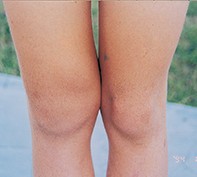Peer Reviewed
Feature Article Arthritis
Investigating the child with arthritis
Abstract
Here is a summary of the clinical approaches to some of the more frequently encountered conditions in children presenting with joint swelling.
Key Points
- Be sure the child has arthritis before investigating further.
- Disease pattern recognition is important in the classification of arthritis as imaging and laboratory findings may be relatively nonspecific.
- An acute swollen joint in a febrile child should be investigated for septic arthritis using joint aspiration and culture.
- In the physical examination of patients with arthritis, systemic features such as fever, rash or uveitis should be looked for in addition to the number and distribution of swollen joints.
- For chronic arthritis, the investigative tests performed depend on the presenting clinical picture. Appropriate tests include antinuclear antibody, anti-double stranded DNA antibodies, HLA–B27, rheumatoid factor, complement, full blood count, erythrocyte sedimentation rate, C-reactive protein, urinalysis and renal function tests.
Purchase the PDF version of this article
Already a subscriber? Login here.

